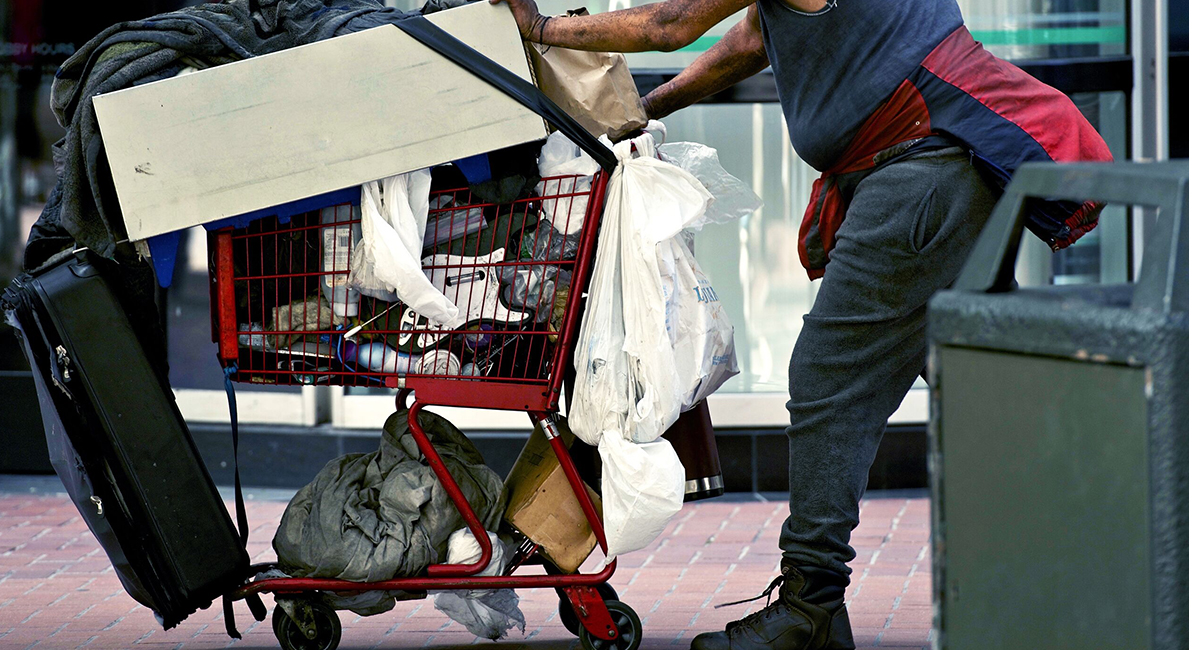California is home to about 12 percent of the country’s population but has about 30 percent of the total homeless population, and about 47 percent of the country’s unsheltered homeless. Homelessness is arguably the state’s most pressing issue and has been for decades, despite state and local government throwing billions at the problem, year after year.
How much has been spent? Between 2019 and 2021, $12 billion. How much worse is homelessness? A nearly seven percent increase between 2019 and 2020.
I can imagine you have some questions. Where does the money go? Well, that’s complicated, what with so many programs and agencies involved in this business. Why does homelessness get worse? Because throwing money at problems without thinking them through usually doesn’t succeed. Why don’t we have a better estimate of how many people are homeless, who they are, and why they are homeless? Exactly.
We should have answers to these questions, but we don’t, even though homelessness has been at a crisis level for decades in the state. But perhaps we might make some progress this year if the Legislative Democrats and the governor are willing to open the door to their Republican colleagues and pursue this issue on a bipartisan basis, because this chronic, inhumane, and grossly expensive failure will not get better without a true bipartisan effort.
Last month, many of California’s Republican state legislators in both the State Senate and Assembly sent a letter to Governor Gavin Newsom urging him to call an extraordinary legislative session to address these and other questions about California homelessness to create new approaches to deal with this issue.
There is absolutely no question that the state’s approach to homelessness needs a complete do-over. And the Republicans get this. The Republican letter tells us exactly why the policies implemented over decades, ones that likely have exceeded $100 billion in spending over the last 25 year, have failed.
One key factor behind the failure identified by Republican lawmakers, one that would jump out at anyone, is that there is no accountability in the vast sea of homelessness agencies and programs. If there were accountability, we would understand these failures. If there were accountability, we would not continue to blindly spend billions every year without asking why we aren’t moving the needle. If there were accountability, we would have had the equivalent of an extraordinary legislative session long ago to come up with a game plan that has the potential to win, instead of doubling down on chronic failure.
Apropos of this being the week of the Super Bowl, if California homelessness policy were a football team, then the coaching staff and general manager would have been fired and the NFL would have booted out the team’s owner, all long ago. Complete do-over. And this complete do-over should begin with implementing accountability.
Perhaps the most striking failure of all this is that California, the most technologically advanced state in the country, still does not have an information technology infrastructure in place to adequately compile data and analyze these data to make informed policy choices. To implement accountability, we need information so that we can better understand the issues and measure our progress.
Just how good are our data? Not very good. The US Department of Housing and Urban Development (HUD) coordinates a single-point-in-time count of sheltered and unsheltered people experiencing homelessness on a single night in January. What we do know is that the state’s homeless population is almost certainly larger than what is reported to HUD, presently around 160,000, and is perhaps much larger.
The Republican letter also highlights another major factor behind our failure to make progress on homelessness. The letter argues forcefully that the state has focused far too much on the idea that homelessness can be solved if we just build more housing. If it were only that simple. Republican lawmakers have identified the 800-pound gorilla in the room: mental health issues and substance abuse.
This makes dealing with homelessness exponentially more difficult and requires that we fundamentally rethink nearly everything we have been doing on this front. And this is where compiling better data is crucial for understanding the next step. Current official estimates for those among the California homeless population struggling with mental health issues, substance abuse, or both is about 29 percent, but the Los Angeles Times found a 67 percent rate. The implications for designing effective policies based on which of these numbers you pick are enormous.
I suspect that the number is much closer to the LA Times estimate than the official estimate, given that other studies of homeless, including those of different homeless populations, find that around 50 percent or more of homeless people deal with mental health issues or substance abuse, with one study finding nearly an 80 percent rate of mental health/substance abuse issues. And this leads Republicans to identify creative solutions that have the potential to truly move the needle, by providing medical care and treatment for those with these illnesses.
I had the opportunity to speak with one of the letter signatories, Senator Pat Bates (R-Laguna Niguel), about the Republican ideas to address homelessness. Senator Bates comes from a background as a social worker and thus knows much about these issues. “It is heartbreaking to see what is happening to these individuals,” she remarked. “We must and can do better with investments in data infrastructure and analysis so we know how and where to make investments that will help these individuals and that will improve our communities more broadly.”
Bates and her colleagues recommend prioritizing investments in mental health and substance abuse infrastructure, noting that California has an extreme shortage of inpatient psychiatric capacity and providers, among the worst in the country. They also note that a few demographic groups, including veterans, former foster children, and domestic violence victims, have a comparatively very high chance of experiencing homelessness.
These facts indicate that policies should target these populations to provide support before they fall into homelessness. But currently, there is little, if any evidence of targeted programs toward these constituencies or toward increasing the availability of prevention programs.
Senator Bates stressed the need for a special legislative session so that the many facets of homelessness can be studied under one tent. She also stressed the Republicans’ interest in working cooperatively on bipartisan solutions.
The reaction from Governor Newsom so far? Silence, which is remarkably sad because effective solutions don’t have party lines. And if this silence continues, we will flush billions more into the yawning black hole that has become California homelessness policies—where dollars enter, and where most of those suffering never emerge.








